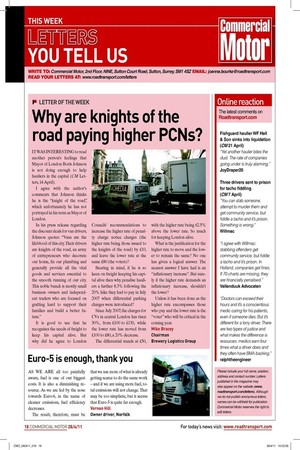LETTER OF THE WEEK
Page 14

If you've noticed an error in this article please click here to report it so we can fix it.
Why are knights of the road paying higher PCNs?
IT WAS INTERESTING to read another person’s feelings that Mayor of London Boris Johnson is not doing enough to help hauliers in the capital (CM Letters, 14 April).
I agree with the author’s comments that Johnson thinks he is the “knight of the road”, which unfortunately he has not portrayed in his term as Mayor of London.
In his press release regarding the discount deals for van drivers, Johnson quotes: “Vans are the lifeblood of this city. Their drivers are knights of the road, an army of entrepreneurs who decorate our home, ix our plumbing and generally provide all the vital goods and services essential to the smooth running of our city. This noble bunch is mostly small business owners and independent traders who are focused on grafting hard to support their families and build a better future.” It is good to see that he recognises the needs of freight to keep his capital alive. But why did he agree to London Councils’ recommendations to increase the higher rate of penalty charge notice charges (the higher rate being those issued to the knights of the road) by £10, and leave the lower rate at the same £80 (the voters)?
Bearing in mind, if he is so keen on freight keeping his capital alive then why penalise hauliers a further 8.3% following the 20% hike they had to pay in July 2007 when differential parking charges were introduced?
Since July 2007, the charges for CVs in central London has risen 30%, from £100 to £130, while the lower rate has moved from £100 to £80, a 20% decrease.
The differential stands at £50, with the higher rate being 62.5% above the lower rate. So much for keeping London alive.
What is the justiication for the higher rate to move and the lower to remain the same? No one has given a logical answer. The nearest answer I have had is an “inlationary increase”. But surely if the higher rate demands an inlationary increase, shouldn’t the lower?
Unless it has been done as the higher rate encompasses those who pay and the lower rate is the “voter” who will be critical in the coming year.
Mike Bracey Chairman Brewery Logistics Group














































